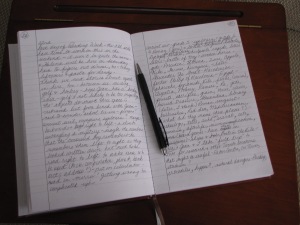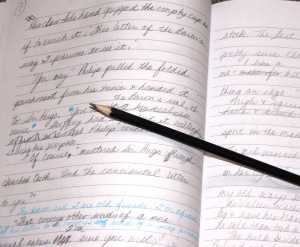 Wow, it’s been a busy two weeks. I had a wonderful time preparing for and presenting a workshop on journaling and creative writing at the College Association for Language and Literacy conference at Humber College this past Thursday. I found the research for the workshop very informative, and learned a lot more about the benefits of keeping a journal. I have no excuse now to not include journaling as part of my writing process, though I am going to be easy on myself if I don’t write in it every day.
Wow, it’s been a busy two weeks. I had a wonderful time preparing for and presenting a workshop on journaling and creative writing at the College Association for Language and Literacy conference at Humber College this past Thursday. I found the research for the workshop very informative, and learned a lot more about the benefits of keeping a journal. I have no excuse now to not include journaling as part of my writing process, though I am going to be easy on myself if I don’t write in it every day.
I managed to complete the first edits of the writing fiction book for pre-teens and the fantasy novel for middle readers, too. I have LOTS to do yet, but I’m feeling good about what’s been done so far.
Here are some writing prompts to keep you creating in June.
1. Use one, some or all of these words in a poem or story:
- jewel, creature, sky, hope, river, crackle
- statue, storm, wall, hole, keep, shudder
- tower, hum, grass, footprints, cache, throw
2. Here are some opening sentences for you to try:
- “Sit here!”
- Some trees were just meant for climbing.
- The hallway echoed with our footsteps.
- The planks were worn and cracked.
- There was a reason why no one ever told me to trust my instincts.
- I thought I’d faced my worst day ever, but I was wrong.
3. See if any of these titles inspire a story or poem: Wind Haven, Shelter, The Open Door, Marnie’s Magic, Tempest House, Dragon Boy, Danger Pay, Restless Winter
4. What scene can you imagine happening around these dialogue excerpts?
- Can we stop here?
- No, we need to keep going
- Why?
- It’s dangerous.
- I don’t see anything.
- It’s in the air.
- Shouldn’t we report this?
- I don’t think so.
- But …. Oh, I see what you mean.
- That’s the last time I’ll tell you.
- Yeah. Right.
- No. Honestly. It is the last time
5. When you were a child, did you make wishes on stars, or birthday candles, or Thanksgiving turkey wish bones? Do you remember what you wished for? Were any of your wishes granted? What do you wish for today? Answer these questions for yourself and then answer them for your character. Consider turning one of today’s wishes into a goal and make a list of what steps you need to follow to have that wish come true. Start working on the first item on that list soon.
6. Here’s a list of some fun events that are celebrated during June. Can you think of a story that you could write around one of them? National Donut Day, Richard Scarry’s birthday, Ballpoint Pen Day, Fly a Kite Day, National Fudge Day, Garfield’s Birthday, Soap Opera Day, Johannes Gutenberg’s Birthday, Chocolate Pudding Day, Meteor Day, Superman’s Birthday. Actually Meteor Day and Superman’s Birthday are on the same day, June 30th. No surprise, I guess. 🙂
Hope you have a creative week ahead!
I’m currently editing, Writing Fiction: A Hands-On Guide for Pre-Teens. If you would like to know when the book comes out, please fill out the following form. I promise that you will not be bombarded with spam emails, just the odd thing that I come across that you might find useful, a couple of sample chapters as I work through the project, and my newest writing prompts.





